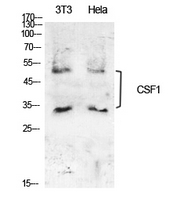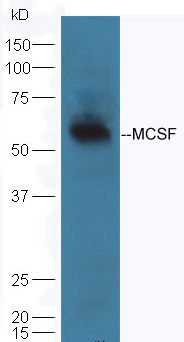M-CSF antibody
GTX39776
ApplicationsFunctional Assay, Western Blot, ELISA, ImmunoHistoChemistry, ImmunoHistoChemistry Paraffin
Product group Antibodies
ReactivityHuman
TargetCSF1
Overview
- SupplierGeneTex
- Product NameM-CSF antibody
- Delivery Days Customer9
- Application Supplier NoteWB: 0.1-0.2microg/ml. ELISA: 0.5-2microg/ml. *Optimal dilutions/concentrations should be determined by the researcher.Not tested in other applications.
- ApplicationsFunctional Assay, Western Blot, ELISA, ImmunoHistoChemistry, ImmunoHistoChemistry Paraffin
- CertificationResearch Use Only
- ClonalityPolyclonal
- Concentration1 mg/ml
- ConjugateUnconjugated
- Gene ID1435
- Target nameCSF1
- Target descriptioncolony stimulating factor 1
- Target synonymsCSF-1, MCSF, PG-M-CSF, macrophage colony-stimulating factor 1, CSF1-hERV-LTR71B fusion protein, colony stimulating factor 1 (macrophage), lanimostim, macrophage colony stimulating factor 1, proteoglycan macrophage colony-stimulating factor
- HostRabbit
- IsotypeIgG
- Protein IDP09603
- Protein NameMacrophage colony-stimulating factor 1
- Scientific DescriptionThe protein encoded by this gene is a cytokine that controls the production, differentiation, and function of macrophages. The active form of the protein is found extracellularly as a disulfide-linked homodimer, and is thought to be produced by proteolytic cleavage of membrane-bound precursors. The encoded protein may be involved in development of the placenta. Alternate splicing results in multiple transcript variants. [provided by RefSeq, Sep 2011]
- ReactivityHuman
- Storage Instruction-20°C or -80°C,2°C to 8°C
- UNSPSC12352203






